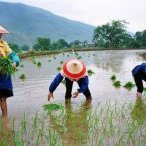English · Español

6 February 2017 | News | Resisting neoliberalism | Forests and biodiversity | Food Sovereignty
China´s main agricultural province bans GMOs to protect biodiversity; Russia also closes its markets to US GM maize
Download: MP3 (2.9 Mb)
The province in question is Heilongjiang, to the North-East of the country. It is the province with the largest area cultivated in China, with crops ranging from soy, rice, maize, wheat, flax and sugar beet. The ban against genetically modified crops will come into force on May 1st.
This was reported by British newspaper Financial Times and lifted by RMALC member, Alejandro Villamar, in an article published by the Latin American Information Agency (ALAI).
The regulation passed by the legislative provincial authorities bans GM maize, rice and soy in China´s top grain producer province, and bans the production and sale of GM crops and GM seeds. As reported by Financial Times, the legislative decision made by the Heilongjiang province comes after Beijing launched plans in August 2016 to develop specific GM crops, which for the first time include soy and maize.
Heilongjiang Province is part of the North-East farming belt of China, together with Jiling, Liaoning and Mongolia provinces. This region produces 44.5% of maize and 1/3 of the rice of the country. China is the world´s largest rice producer and the world´s second maize producer after the US, and fifth soy producer at world level.
Therefore, the changes in this provincial legislation have an inertial and political impact on the rest of the country and the world. There is a potential impact at international level because China is the world´s largest importer of soy from Brazil, Argentina, Paraguay, Uruguay and the US. And most of this imported soy is genetically modified.
According to ALAI´s article "those against GMOs chose to build a broad social alliance to fight and escape the misleading scientist speech", gathering a broad range of scientists, farmers, environmental activists and consumers.
The local media highlighted the opinion of top military officers who in 2014 had criticized GM crops and even military officers from the Guangzhou province who demanded to ban GM food for their troops.
In addition to health effects, the top military officers added arguments related to the impact of dumping imports that have destroyed the old Chinese soy industry and serious thoughts about national security against the GM transnational strategy.
According to a poll carried out in the province "91.5 per cent of survey respondents (...) rejected GM crops", reported the official news agency Xinhua.
The decision made by this strategic province in China is added to the bill under discussion in the Russian Parliament to ban GMOs, which has been welcomed by President Vladimir Putin.
The GM technology, despite the strong media lobby that comes with it, is in a standstill in terms of area cultivated, up to the point that in 2015, it has been reduced.
The number of countries where a legislative and public debate is underway to ban or at least limit GM products is growing and it is quite higher than the number of countries that allow GM crops. The European Union is one of the cases where most of its member countries already ban these crops, but the views are torn.
When passing the regulation of GM maize imports from the US, Russian Agriculture Ministry Alexander Tkachev said: "The Agriculture Ministry is strongly against GMOs, Russian products will remain clean".
Before this, in a meeting of MPs representing rural areas organized by the United Russia party, he said that the government "will not poison its citizens".







